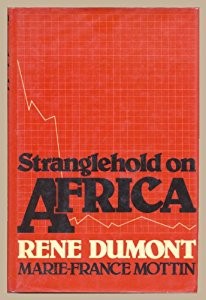In 1962 Rene Dumont wrote False Start in Africa, which offered unique perspectives for the time period, many of which continue to be relevant. I picked up "Stranglehold on Africa" by Rene Dumont and Marie-France Mottin (1983) hoping to find an equally interesting ideas. I did not find it as good as the earlier work. It is highly critical, but has far fewer positive examples (or reasonable recommendations), as the earlier work offered. One can sense Dumont's frustration.
The book would be a welcome source of quotes for those in opposition of international assistance: "It is development that has brought about the worst destruction in the history of the world, on an even more lunatic scale than during the two world wars" (p. xi); "Those who agree to wear the golden chains of aid are soon locked into a vicious circle of increasing dependence" (p. 20); "the looters in the West aren't going to give up without a fight – too many interests are at stake, and the economic machinery has been running smoothly for too long. They scarcely give a thought to the long term and to the future of our planet" (p. 248).
Further: "we urge our readers to remember that we, the developed nations, form the bulk of the privileged beings busily exploiting the planet. The prime responsibility for world famine therefore rests with us. We are the real hypocrites" (p. xii); "We must never forget the genocide perpetrated against the people of Africa, millions of whom were transported as slaves to the plantations of North America; or the wars of conquest that disseminated the slave economy and the system of trading valuable raw materials in exchange for the rejects of our own industrial production; or the colonial economies which were run solely in the interests of the parent state" (p. 1); "the European countries would like to present a picture of themselves as generous, and sympathetic to the interests of the nations they have exploited for so long and on such a large scale, and whom they are now starving. They hope in this way to wipe out the very memory of the original sins of capitalism and the Industrial Revolution, of slavery and colonization, but in fact they are merely repeating them" (p. 7).
The book is also self-critical: "Rereading the book in 1980 I realized that the historical and, more important, the sociological data on which it was based were inadequate. It gives off a strong whiff of Eurocentrism in its approach to the realities of life in Africa" (p. 2). Yet, it still offers critiques of all fields for a myriad of countries, and heavily remains a book about what "we" ought to be doing for "them".
Dumont offers some interesting comments about China, and its comparisons: "In China the peasants would have taken the initiative and dug the channels themselves, but then China, which receives no aid in the way of foodstuffs, relies first and foremost on its own resources" (p. 167). "Tanzania's peasant population haven't inherited the tradition of hard work familiar to their counterparts in China. Circumstances have never forced them into working hard, with the exception of the immigrant workers on the sisal plantations" (p. 168).
1047 Hits
Featured Posts
Tags
Racism
Power
Anthropology
Policy
Migration
Participation
Governance
Poverty
International development
decolonization
South Africa
Land
Ethics
Agriculture
Colonialism
Institutions
Human Rights
Rural Development
Ethnography
Inequality
Culture
Education
Leadership
Democracy
Sustainability
History
Ethiopia
Politics
Colonization
Civil society
Conflict
Books
Revolution
Qatar
Economics
Globalization
Resilience
Capitalism
Interdisciplinary
Post-doc
Climate change
Islam
Africa
Ideology
Development Studies
Food Security
Development
Fellowship
Middle East
Gender

